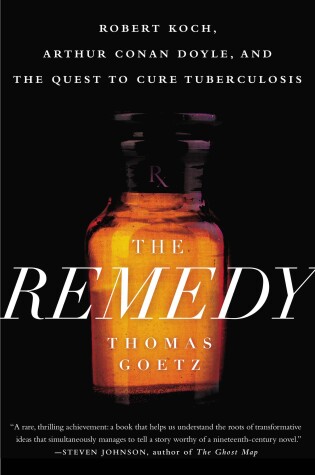
The riveting history of tuberculosis, the world’s most lethal disease, the two men whose lives it tragically intertwined, and the birth of medical science.
In 1875, tuberculosis was the deadliest disease in the world, accountable for a third of all deaths. A diagnosis of TB—often called consumption—was a death sentence. Then, in a triumph of medical science, a German doctor named Robert Koch deployed an unprecedented scientific rigor to discover the bacteria that caused TB. Koch soon embarked on a remedy—a remedy that would be his undoing.
When Koch announced his cure for consumption, Arthur Conan Doyle, then a small-town doctor in England and sometime writer, went to Berlin to cover the event. Touring the ward of reportedly cured patients, he was horrified. Koch’s “remedy” was either sloppy science or outright fraud.
But to a world desperate for relief, Koch’s remedy wasn’t so easily dismissed. As Europe’s consumptives descended upon Berlin, Koch urgently tried to prove his case. Conan Doyle, meanwhile, returned to England determined to abandon medicine in favor of writing. In particular, he turned to a character inspired by the very scientific methods that Koch had formulated: Sherlock Holmes.
Capturing the moment when mystery and magic began to yield to science, The Remedy chronicles the stunning story of how the germ theory of disease became a true fact, how two men of ambition were emboldened to reach for something more, and how scientific discoveries evolve into social truths.
Originally posted on my blog, A Lovely Bookshelf on the Wall:
The Remedy takes you through medical and literary history, right around the time the foundation was laid for modern medicine. Handwashing was controversial. Hospitals had open jars of ointment in the operating room, and surgeons would scoop out what they needed without washing their hands in between patients. This book made me thankful for germ theory. For basic hygiene. For vaccines!
I couldn't wait to find out what happened next. I really got a feel for how relentless tuberculosis was, and how hopeless it seemed. Would the public be convinced of Koch's findings? Would other scientists be swayed? I found this book to be absolutely riveting, and that surprised me when I considered it's basically a non-fiction book about germs, medicine, and scientific research. But it reads in a narrative style, in layman's terms; so it was enjoyable throughout, and I didn't once feel bogged down.
The Arthur Conan Doyle connection was a teensy bit looser than I had hoped it would be, but it was an interesting angle nonetheless. I was impressed by how cutting-edge Sherlock Holmes's forensic methods were for the time, and what a huge impact these novels had on the scientific community.
I received a copy of this book from the publisher via NetGalley in exchange for my honest review.
Reading updates
-
Started reading
-
10 March, 2014:
Finished reading
-
10 March, 2014:
Reviewed
